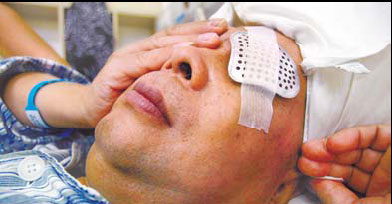Suspects detained in case involving fake eye drug
|
|
|
A patient who was injected a fake eye drug receives treatment at Shanghai No 1 People's Hospital in this file photo. [China Daily] |
Authorities have detained a number of suspects involved in the selling of fake eye drug that caused negative side effects in 61 patients at Shanghai No 1 People's Hospital in September.
The Shanghai Ruijin-AmMed Cancer Center, which purchased the fake drug Avastin and sold it to patients, was also closed by authorities. Computers, medical storage and related equipment were taken away for investigation.
According to the information office of the Shanghai municipal government, the detainees were employees of the cancer center and pharmaceutical dealers.
The cancer center, licensed four years ago, was established by the Shanghai Ruijin Hospital and Hong Kong AmMed International Co.
After the scandal broke, the Ruijin Hospital claimed the cancer center operated independently from the hospital, especially in drug purchasing and patient treatment.
Sixty-one of the 116 people who received the fake medicine on Sept 6 and 8 at Shanghai No 1 People's Hospital reported pain, inflammation, red eyes and unclear vision.
The Shanghai Food and Drug Administration began immediate investigations while four remaining bottles of Avastin were tested.
According to the food and drug administration, the drug given to the patients was not the real Avastin - made by the global pharmaceutical giant Roche - but was labeled as a Roche manufactured product with batch number B6001B01.
The fake drug was purchased by the cancer center and was sold directly to the patients who brought it to hospital for injection.
Avastin, the trade name of bevacizumab, blocks a protein used to build blood vessels and is used to combat the growth of cancer cells and slow the effect of diabetes and other diseases in the eyes. It was used widely in hospitals for eye treatments several years ago in China but was not officially recognized nor approved by local authorities.
"As a type of medicine that has to be injected into the eyes and stay in the environment for a certain period, even real Avastin probably will cause similar negative effects on patients," said Chen Jie, deputy professor on ophthalmology at the Eye Hospital Affiliated to Wenzhou Medical College, Zhejiang province.
According to the National Business Daily, Shanghai No 1 People's Hospital paid a minimum compensation of 2,000 yuan ($300) each to most of the discharged patients.
At the moment, six patients are still under examination in hospital for treatment while others have recovered and returned home.
 0
0 








Go to Forum >>0 Comments